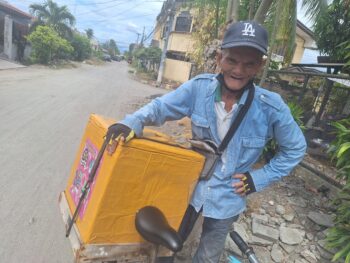And based on Department of Education statistics, this reality that recurs every opening day of classes would be the same scattered concern fitted into the bigger picture of also recurring backlogs in number of classrooms, teachers, and instructional materials.
Even then, the DepEd told a news conference here at the government-ran Philippine Information Agency, that "its all systems go" for the 820,000 students across the region.
Susana Teresa B. Estigoy, DepEd, officer-in-charge and assistant regional director told MindaNews they have "employed measures", from May 23 to June 8, "to ensure the smooth opening of classes, including a campaign for full-enrolment of all school-age children".
DepEd 11 announced that in the region, around 18 percent of all elementary pupils, or 105,741 pupils, and 29 percent of all high school students, or 53,190 students, would have no seats. The department estimated around 583,021 elementary pupils and 185,190 students in the region.
The region would be short of 2, 257 elementary and 1,419 high school teachers for the school year 2007-2008, the DepEd said. In infrastructure, the DepEd also lacked 783 classrooms in elementary schools and 1,193 in secondary schools.
There are 1,615 elementary schools and 274 high schools in the region.
The other emergency measures would be conducting double-shift and multi-grade classes to cope with the problem in the short run. Estigoy showed to reporters the extent of the backlogs using a "color coding" scheme.
For example, about 81 percent of elementary schools were classified as "blue", or those which met the "one-setting" requirement, meaning only one set or section of students could hold classes in their respective classrooms.
With a class-size ratio of one teacher to 56 students, there would be 111 elementary schools that would hold two shifts of classes in one classroom.
There would be 38 schools, however, where students have no classrooms and labelled in the coding as "black". Most of these schools were in Davao del Sur.
Only around 38 percent of public high schools have a one class-one classroom ratio. In 95 high schools, or 35 percent of the 274, two shifts would be held to accommodate the students.
Estigoy said the DepEd already tapped other partners, including the private sector and the local government, to help them cope with the government's limited budget to build additional classrooms and hire more teachers.
Even if DepEd would get the highest chunk in the national budget, "it is not enough to support the backlogs", Estigoy said, pointing out that backlogs pile up every year.
She said the region could only get, for example an allotment of at least 60 out of its 600 additional classrooms needed every year. The allotment to cover local backlogs has not yet arrived, Estigoy said.
"As long as the number of students continues to increase every year, the backlogs will grow," she said.
She added that reported corruption in the department has also affected its capacity, saying they are counting on the integrity of individual teachers and employees to use properly its limited resources.
DepEd ranks second among government agencies with the most number of graft charges at the Office of the Ombudsman in Mindanao in 2006. Estigoy said the alleged number of corrupt cases refer only to complaints and not yet on resolutions.
"We have a lot of committed people in DepEd," she said.
